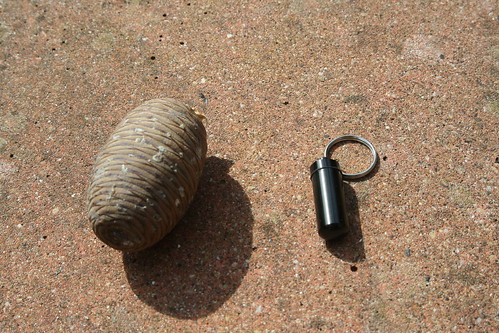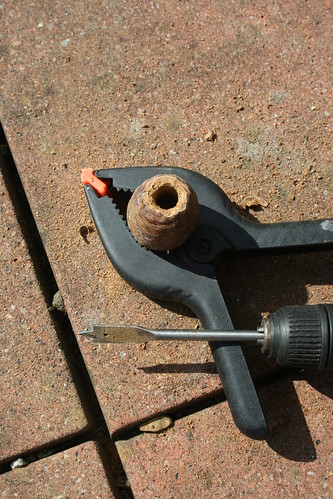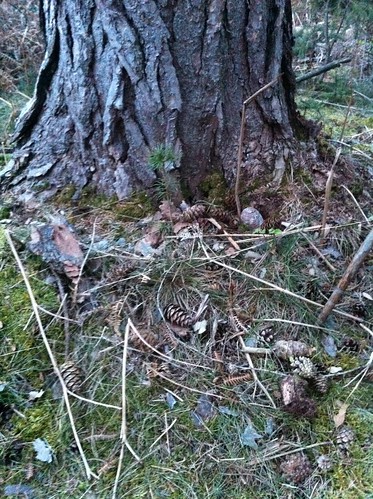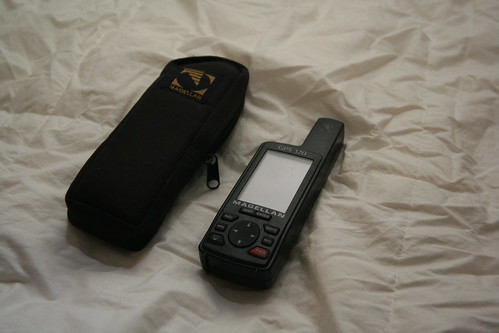Having moved to Calne recently, I'm impressed with the number of caches nearby. However, there seemed to be an obvious hole in the map, and I've been looking for somewhere to lay a series for a while. The Bowood Estate is private property, but there is a public foot path that curls around the south of its borders, starting in Calne and curving around the Estate towards Chippenham, ending at the George pub in Sandy Lane.
The walk from Calne Leisure Centre to the last cache and back is some 8.5 Km in total. You'll see deer, ducks and other wildlife if you're quiet.
I've opted for a baker's dozen of caches, with the last being a bonus cache requiring some information from several of the preceding caches. I'll not give much away, but it is quite a cool final container. Some of the other containers are the usual mix of micros and small clip lock boxes, but I did also mange to use a few of the more interesting ones that I'd been hoarding for a while.
I hope people will enjoy the series. I've had good feedback from the FTF logs, so I've got high hopes for it. There are plans to extend even further and make a loop.
The series starts here.
UK Geocachers Blog
A blog about Geocaching in the UK
Tuesday, 28 May 2013
Monday, 11 June 2012
Munzee Madness
We went on a road trip this weekend gone and found a cache that contained a 'Munzee'. I'd never heard of these before, but I downloaded the app to my iPhone and scanned the QR code. Instantly, I received some points for the scan (the 'capture') and my interest was piqued. We picked up a couple more over the weekend and the idea has stuck.
According to the website: "Munzee is a real world scavenger hunt game where players are rewarded for finding and capturing hidden objects." The objects are actually printed QR codes - those 3D barcodes that have appeared everywhere - that are then stuck to objects. I've only found them stuck on the back of signs so far.
I was in London for work today and went out - despite the rain - into territory round my office where I have found all the Geocaches in search of Munzees. I found loads, including some virtual ones, and even got First To Find for a couple. This is a very new game in this country and I'm pretty interested in seeing where it goes.
I'm about to head out into the rain to deploy my own first Munzee in a moment. I suggest you check out the website and get involved!
According to the website: "Munzee is a real world scavenger hunt game where players are rewarded for finding and capturing hidden objects." The objects are actually printed QR codes - those 3D barcodes that have appeared everywhere - that are then stuck to objects. I've only found them stuck on the back of signs so far.
I was in London for work today and went out - despite the rain - into territory round my office where I have found all the Geocaches in search of Munzees. I found loads, including some virtual ones, and even got First To Find for a couple. This is a very new game in this country and I'm pretty interested in seeing where it goes.
I'm about to head out into the rain to deploy my own first Munzee in a moment. I suggest you check out the website and get involved!
Friday, 4 May 2012
Groups: To Log or Not To Log
Imagine arriving at a cache site with a group of friends, knowing in advance that the cache is either notoriously difficult to find or involves some degree of athletic ability to retrieve. Eventually, someone locates the cache, or alternatively balances their way up a slippy slimy tree and brings it down to the ground. Who can legitimately sign it? Who is allowed to claim that they found the cache?
This has been the subject of some discussion among some of my caching friends of late. It's not really bothered me much until I've started creating more complex or dangerous caches myself. I've begun to form an opinion recently and I'd like to share my thoughts.
Caching in a group (or a pair) makes the hobby a lot more fun. In fact, the social interaction is what really makes it worthwhile for me. It's doing something as a team, with a group of mates, with your girlfriend. I'm not suggesting that group caching should be limited or stopped in anyway. It's exactly how I get my kids out for a walk of a weekend. We regularly head out and, together, collect a circuit of caches. In fact, the kids argue robustly over who gets to find the cache and who gets to put it back afterwards! We all claim the cache as 'found' even though, probably, my four year old grabbed it from behind the tree.
Clearly, I have no problem with group caching and everyone should be able to claim and log the find, right?
Right. Except that there are a number of caches where that's just not appropriate. Since the frosts have receded and the nights have grown longer, I've been heading out to collect a number of tree climb caches. I've even set one myself. These tend to be rated as fairly low difficulty (you can see it in the tree), but with a high terrain level. You don't need special equipment, but you do need to be able to climb the tree, hold on while signing the log with one hand, and get down again uninjured.
I don't believe that it is fair to the cache owner - or moreover the person who risks life and limb to retrieve the cache - for everyone in the group to claim the find unless they too go up the tree. I agree that this means that not everyone will be able to log the find, despite having walked just as far as those who do manage it. This is the point of high terrain caches, of course: to test the mettle of the finder. If you can't get up the tree (or under the bridge, or balance on the rafters, or abseil out of the tower...) then you can't log the cache.
This is the way we have decided to behave while hunting high terrain caches. If I can get up the tree, but Katy can't, then I log it and she doesn't. End of story.
But here is some grey area thinking: What if a cacher climbs up and touches the cache? In a pair, can one collect the cache, they both sign it and then the other places it back? How does this work for larger groups?
The same might be seen to be true for very difficult to find caches. We've found a few that have kept us working on them for ages. Sometimes, multiple visits have been needed to the cache site before we've finally unearthed it. Should we both log the cache when, technically, only one of us found it? We both looked just as hard as one another and one essentially got lucky. When caching with friends, it's not very easy to find a challenging cache, sign it and place it back without your friends spotting you! And I know that I tend to shout "Got it!" before I've even thought about it...
The other other challenging area is puzzle caches. Should everyone have to solve the puzzle before they get to log it? I'm tempted to agree with this premise, but in reality it rarely happens that way. Most often, Katy has the time to solve the puzzles (part time worker, see...) and I provide an extra pair of eyes at the cache site. Not always, but most often. Should I be logging these?
I'm interested in starting some healthy debate on this subject, so please feel free to comment below.
Wednesday, 18 April 2012
Geocaching abroad
Last weekend, we managed three more countries in which we've now geocached: France, Belgium and the Netherlands. These add to the UK and Iceland to give us a grand, slightly shameful, total of five countries.
Geocaching abroad is highly recommended although it does include a few added difficulties, namely a language barrier that can be an issue with some of the caches, especially the hints! A little prior planning, including judicious use of google translate, and you should be fine :-)
So next time you go abroad, have a quick look on geocaching.com and enjoy some foreign caches too. We saw some fantastic places that we'd otherwise not have found in Iceland as a result!
Geocaching abroad is highly recommended although it does include a few added difficulties, namely a language barrier that can be an issue with some of the caches, especially the hints! A little prior planning, including judicious use of google translate, and you should be fine :-)
So next time you go abroad, have a quick look on geocaching.com and enjoy some foreign caches too. We saw some fantastic places that we'd otherwise not have found in Iceland as a result!
Wednesday, 4 April 2012
Where's the Pin?!
I've just made a new cache container using a pine cone that I picked up over the weekend. Can't wait to drop this one off somewhere!
Here are the raw materials. One pine cone and one waterproof nano container.

Then I drilled out the middle with a 14mm bit:

And finally inserted the cache into the camo container:

Like it? I'm quite pleased with it... especially now that it has been released into the wild:

Here are the raw materials. One pine cone and one waterproof nano container.

Then I drilled out the middle with a 14mm bit:

And finally inserted the cache into the camo container:

Like it? I'm quite pleased with it... especially now that it has been released into the wild:

Wednesday, 11 May 2011
How I got into GeoCaching
I've been into Geocaching since 2006. I was introduced to it by a customer while I was working on site on a firewall install. "What are you doing at lunchtime?" "Nothing, why?" "You're coming for a walk with me then..." I went out for a walk with her that lunchtime into the middle of nowhere armed with her Garmin GPS and a map. I was hooked on the idea immediately. There is something that appeals to the little boy in me that watched James Bond and always wanted to be part of something clandestine. Geocaching is certainly still under the RADAR of most people.

What do you get out of caching? Well, it's true that there is no material gain from it. In fact, it costs you money in fuel, a GPS and shoe leather. But if you're a walker already, it can be a great way to find some new spots that you would never have otherwise visited. There are so many caches in a typical area that this game is open to anyone. I've been getting my kids to assist in finding caches, so they are learning about using maps, understanding aerial photos and so on.
From the Geocaching website: "Geocaching (pronounced gee-oh-cashing) is a worldwide game of hiding and seeking treasure. A geocacher can place a geocache in the world, pinpoint its location using GPS technology and then share the geocache's existence and location online. Anyone with a GPS device can then try to locate the geocache."
That was good because I had a GPS, so I started heading out to find caches whenever I could. As I travel a lot for work, this meant that I've visited caches from Chester to Milton-Keynes. It was always tricky in those early days however, as I was using a first generation Magellan marine GPS (shown below), a paper map and a notebook with details copied from the website. The co-ordinate references were given in a format that wasn't directly compatible with my GPS, so I had to convert them before I could go hunting.

Good times.
Ok, rubbish times. So bad, in fact that I pretty much gave up until 2010 having only found 30 or so caches. I found a couple along the way here and there, but mostly this game became dead to me.
Now that I'm using my iPhone and iPad for geocaching, the world is very, very different. It's awesome to be able to access the Internet and download information about local caches, while the GPS on the iPhone is far quicker and more accurate than that old Magellan ever was. Access to 'always on' online mapping technology from Google Maps and/or Bing means that finding a cache is a much better experience.
Now that I'm using my iPhone and iPad for geocaching, the world is very, very different. It's awesome to be able to access the Internet and download information about local caches, while the GPS on the iPhone is far quicker and more accurate than that old Magellan ever was. Access to 'always on' online mapping technology from Google Maps and/or Bing means that finding a cache is a much better experience.
What do you get out of caching? Well, it's true that there is no material gain from it. In fact, it costs you money in fuel, a GPS and shoe leather. But if you're a walker already, it can be a great way to find some new spots that you would never have otherwise visited. There are so many caches in a typical area that this game is open to anyone. I've been getting my kids to assist in finding caches, so they are learning about using maps, understanding aerial photos and so on.
Subscribe to:
Posts (Atom)